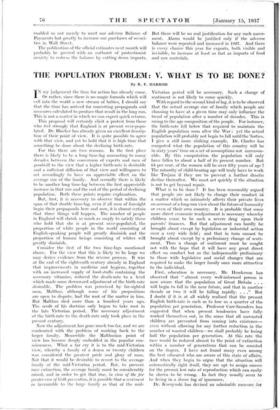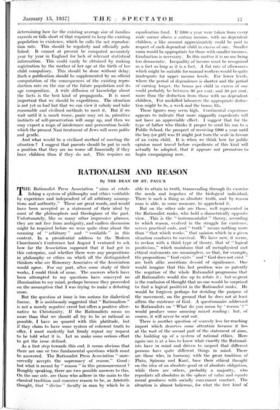THE POPULATION PROBLEM : V. WHAT IS TO BE DONE
?
By R. F.
IIARROD
TN my judgement the time for action has already come. Or rather,. since there is no magic formula which will call into the world a new stream of babies, I should say that the time has arrived for concerting propaganda and measures calculated to produce that result in the long run. This is not a matter in which we can expect quick returns. This proposal will certainly elicit a protest from those who feel strongly that England is at present over-popu- lated. Dr. Blacker has already given an excellent descrip- tion of their point of view. It is quite possible to agree with that view, and yet to hold that it is high time that something be done about the declining birth-rate.
For this there are two reasons. In the first place there is likely to he a long time-lag amounting to many decades between the conversion of experts and men of goodwill to the view that a higher birth-rate is desirable and a sufficient diffusion of that view and willingness to act accordingly to have an appreciable effect on the average size of the family. And secondly there is likely to be another long time-lag between the first appreciable increase in that size and the end of the period of declining population. Both these points require explanation.
But, first, it is necessary to observe that within the span of that double time-lag, even if all men of foresight begin their propaganda here and now, it is almost certain that three things will happen. The number of people in England will shrink so much as amply to satisfy those who hold that she is at present over-populated, the proportion of white people in the world consisting of English-speaking people will greatly diminish and the proportion of human beings consisting of whites will greatly diminish. • Consider the first of the two time-lags mentioned above. For the view that this is likely to be large we may derive evidence from the reverse process. It was at the end of the eighteenth century already in England- that improvements in medicine and hygiene,- together with an increased supply of food-stuffs containing the necessary vitamins, reduced the death-rate to a level which made some downward adjustment of the-birth-rate desirable. The problem was perceived by - far-sighted men. Malthus, although some of his propositions are open to dispute; had the root of the matter in him.; But Malthus died more than a 'hundred years ago.:. The seeds of his doctrine only began to take root in the late Victorian period.. The necessary adjustment of the birth-rate to the death-rate only took place in the present century.- Now the adjustment-has gone much too far, and we are confronted with the -problem- of working back to the- larger family. Meanwhile the •Malthusian..-- point of view has become deeply embedded in the _popular con-. sciousness. What a far cry it is to the mid-Victorian view, whereby a family of a dozen or twenty - children- was considered the greatest pride and glory of -man:- Not that it would be desirable to -revert to -the average- family; of- the - mid-Victorian period. But,- to prevent race extinction, the average family must be considerably- raised, and in order to get that rise; in view of Ike far greater ease of birth prevention, it is possible that a -sentiment • as favourable to the large family as that- of the- mid- Victorian period will be necessary. Such a change of sentiment is not likely- to come quickly.
With regard to the second kind of lag, it is to be observed that the actual average size of family which people are choosing to have at a given time may only influence the trend of population after- a number of decades. • This is owing to the age composition of the people. For instance, the birth-rate fell below that required -to maintain the English population soon after the War ; yet the :actual population will probably not begin to fall until the 'forties. I give a still more striking example. Dr. Charles has computed what the population of this •country will be in sixty years' time on a set of assumptions not unreason- able. By this computation the population will only have fallen to about a half of its present number. But 64 per cent. of the women will be over fifty years of age I The minority of child-bearing age will truly have to work like Trojans if they are to prevent a further drastic decline thereafter. We must act quickly if the situation is not to get beyond repair.
What is to be done ? It has been reasonably argued that people are not likely to change their conduct in a matter which so intimately affects their private lives on account of a long-run view about the future of humanity or even of their own country. It is probable that some more direct economic readjustment- is necessary whereby children cease, to be such a severe drag upon their parents' finances. But that adjustment can hardly be, brought about except by legislation •or industrial- action. over a very wide field ; and that in turn cannot be brought about except by a preliminary change of senti- ment. Thus a change of sentiment -must be sought not with the hope that it will have any great -direct effect on conduct but as the indispensable preliminary to those wide legislative and social changes, that- are required to- make the larger family once more attractive to the individual.
First, education is necessary. Mr. Henderson has observed that " almost every well-informed person is now aware that the population of Great Britain . . will begin to fall in the hear future, and that in another decade or two it will be falling rapidly. . . ." But I doubt if it- is at all widely realised that the present English birth-rate is such as to lose us a quarter of-the- population per generation. -Professor Carr-Saunders has suggested that when present tendencies have fully worked themselves out, in - the sense that all unwanted children are prevented from coming into existence--, even without allowing for any further reduction in the number of wanted children—we shall probably be losing- half the population per generation. At this rate the race would be reduced almost to the point of extinction- within a number of generations that- can be counted on the • fingers. I • have not • found many even -among the best educated- who- are aware of this state -of affairs.. And when they begin to argue that the situation-will automatically -right itself, they are apt .to assign .eauses.• for the present: to Tate of- reproduction which can easily- be shown - to • -be -wrong,:•- In - -fact they usually-•seein be -living in a- dense -fog- of ignorance,- - , - Dr. Kuczynski has devised- an admirable measure for determining how, far the existing average size of families exceeds or falls short of that required to keep the existing population in existence, which he, calls the net ,reprodue- tion rate. This should be regularly and officially pub- lished. It eannot at present be computed accurately year by year in England for lack of relevant statistical information. This could easily be obtained by making registration by the mother of her age at the birth of her child compulsory. This should be done without delay. Such a publication should be supplemented by an official computation of the consequences of the existing repro- duction rate on the size of the future population and its age composition. A wide diffusion of knowledge about the facts is the best kind of propaganda. It is most important that we should be expeditious. The situation is not yet so bad but that we can view it calmly and take reasonable and civilised methods to meet it. But if we wait until it is much worse, panic may set in, primitive instincts of self-preservation will surge up, and then we may expect a reign of intolerance and persecution beside which the present Nazi treatment of Jews will seem polite and gentle.
And what would be a civilised method of meeting the situation ? I suggest that parents should be put in such a position that they are no worse off financially if they have children than if they do not. This requires an equalisation fund. If £300 a year were taken from every male earner above A certain income, with no dependent children, a like amount approximately could be paid in respect of each dependent child in excess of one. Smaller sums would be appropriate for those with smaller incomes. Graduation is necessary. In this matter it is no use being too democratic. Inequality of income must be recognised as a fact so long as it is a fact. A flat rate of allowances which might be suitable for manual workers would be quite inadequate for upper income levels. For lower levels, where the period of dependence is shorter and the period of earning longer, the bonus per child in excess of one could probably be between 30 per cent. and 50 per cent. more than the deduction from those with no dependent children. For unskilled labourers the appropriate deduc- tion might be 8s. a week and the bonus 12s.
These figures may seem high. Continental experience appears to indicate that more niggardly expedients will not have an appreciable effect. I suggest that for the type of father who thinks it proper to send his son to a Public School, the prospect of receiving £300 a year until the boy (or girl) was 21 might just turn the scale in favour of an extra child. It is when we think how far public opinion must travel before expedients of this kind will actually be adopted, that it appears not premature to begin campaigning now.











































 Previous page
Previous page